
Network Action Plans
Network action plans have been developed to deliver the vision of an Ipswich transport system that is safe, reliable and provides for the sustainable movement of people and goods for all travel modes.
iGO Active Transport Action Plan
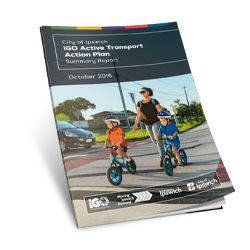 In order to meet the growing travel demands of Ipswich and achieve a better quality of life for the community, council recognise that greater emphasis must be given to promoting and realising the opportunities and benefits associated with more sustainable forms of travel such as active transport (e.g. walking and cycling).
In order to meet the growing travel demands of Ipswich and achieve a better quality of life for the community, council recognise that greater emphasis must be given to promoting and realising the opportunities and benefits associated with more sustainable forms of travel such as active transport (e.g. walking and cycling).
As a result, council has developed an Active Transport Action Plan (a key action of iGO, the City of Ipswich Transport Plan) to guide the planning, delivery and promotion of facilities and programs to encourage more people to walk and cycle for transport purposes in Ipswich.
- iGO Active Transport Action Plan - Technical Report (PDF, 7.3 MB)
- iGO Active Transport Action Plan - Summary Report (PDF, 9.7 MB)
Related Resources
iGO Public Transport Advocacy and Action Plan
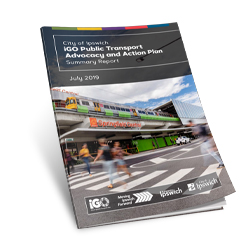 An effective public transport system is a key part of any growing city’s continued social well-being, economic prosperity and environmental health. Ipswich City Council's iGO Public Transport Advoacy and Action Plan (a key action of the iGO City of Ipswich Transport Plan), seeks to use local knowledge of the Ipswich community's transport needs to advocate to key public transport stakeholders for public transport improvements in Ipswich and undertake actions to support and prioritise public transport where appropriate.
An effective public transport system is a key part of any growing city’s continued social well-being, economic prosperity and environmental health. Ipswich City Council's iGO Public Transport Advoacy and Action Plan (a key action of the iGO City of Ipswich Transport Plan), seeks to use local knowledge of the Ipswich community's transport needs to advocate to key public transport stakeholders for public transport improvements in Ipswich and undertake actions to support and prioritise public transport where appropriate.
Related Resources
iGO Intelligent Transport Systems Strategy
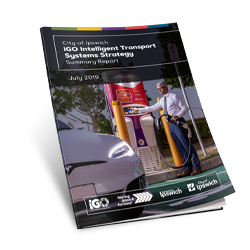 The iGO Intelligent Transport Systems Strategy outlines Council’s tactical approach to the deployment of intelligent transport capabilities to Ipswich’s transport system. Over the next decade, the Strategy will assist Council in meeting the sustainability outcomes of iGO from an environmental, social, economic and financial perspective.
The iGO Intelligent Transport Systems Strategy outlines Council’s tactical approach to the deployment of intelligent transport capabilities to Ipswich’s transport system. Over the next decade, the Strategy will assist Council in meeting the sustainability outcomes of iGO from an environmental, social, economic and financial perspective.
The strategy is visionary and recommends a way forward to resource, advocate, trial, support and execute the plan in partnership with other levels of government, industry, businesses and the community.
- iGO Intelligent Transport Systems Strategy - Technical Report (PDF, 16.3 MB)
- iGO Intelligent Transport Systems Strategy - Summary Report (PDF, 2.1 MB)
Related Resources
iGO Road Safety Action Plan
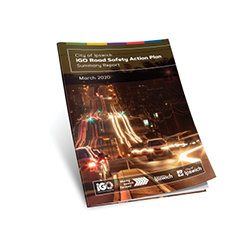 Road safety is an issue that requires an on-going commitment from road authorities and the community to see positive influence. The iGO Road Safety Action Plan (RSAP) outlines an ambitious but realistic vision for reducing road trauma in Ipswich. It details the shared responsibility of all to collaboratively work towards reducing road trauma on the Ipswich transport network.
Road safety is an issue that requires an on-going commitment from road authorities and the community to see positive influence. The iGO Road Safety Action Plan (RSAP) outlines an ambitious but realistic vision for reducing road trauma in Ipswich. It details the shared responsibility of all to collaboratively work towards reducing road trauma on the Ipswich transport network.
This plan targets a continuous annual reduction in Fatal and Serious Injury (FSI) crashes, with 11 specific targets to address key opportunities for improvement. These targets are addressed by focusing on five areas of influence, through which 45 actions have been identified for Council and its stakeholders to implement acknowledging the strengths, capabilities, responsibilities and resources of each organisation.
iGO Freight Action Plan
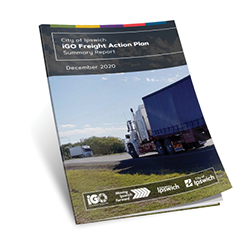 The city is dependent on the freight industry to deliver essential goods and services to support and assist local industries and businesses to fully capitalise on the strategic advantages of Ipswich, those being its location on major interstate and intrastate highways, motorways and rail lines, the abundance of greenfield industrial land, and its close proximity to South East Queensland markets and the Port of Brisbane.
The city is dependent on the freight industry to deliver essential goods and services to support and assist local industries and businesses to fully capitalise on the strategic advantages of Ipswich, those being its location on major interstate and intrastate highways, motorways and rail lines, the abundance of greenfield industrial land, and its close proximity to South East Queensland markets and the Port of Brisbane.
The development of the iGO Freight Action Plan has seen council working with key state agencies, freight industry and local businesses to identify the challenges facing the city and to develop key strategies and actions that need to be implemented over coming years. This will ensure that industries and businesses across the city are supported and grow by having efficient, safe and sustainable freight networks that link the city’s freight generating centres, as well as domestic and overseas markets.
iGO Parking Action Plan
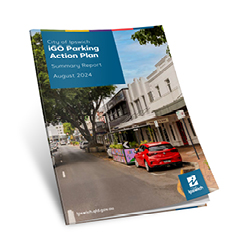
Parking is one of the biggest challenges facing local governments (including the City of Ipswich) as the impacts of population growth, increased traffic and congestion, and the associated demands on transport infrastructure (including parking) can often require significant attention, resources and investment.
The iGO Parking Action Plan (PAP) replaces the former Ipswich City Centre Parking Strategy adopted by Ipswich City Council in 2011.
A key foundation of the PAP is the need to take a ‘demand management approach’ to parking as opposed to a ‘demand satisfaction approach’ to parking. This approach acknowledges that existing car parking supply should be optimised before new car parking supply is considered.
The PAP supports a ‘Place Based’ approach to kerbside allocation and establishes a parking and kerbside management framework for both Ipswich Central and the Springfield Town Centre.
Future Network Action Plans
- iGO Direction Sign and Route Marker Action Plan
- iGO Local Area Traffic Management Action Plan
Contact Details
iGO Project Team
Infrastructure Strategy Branch
Ipswich City Council
Phone: 07 3810 6666
Email: igoipswich@ipswich.qld.gov.au
Postal: PO Box 191, Ipswich QLD 4305